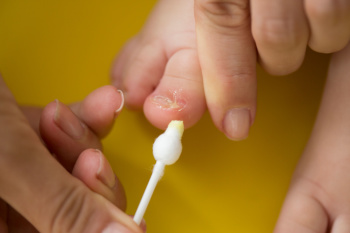
Ingrown toenails in children often result from improper nail trimming, wearing tight footwear, or injury. When nails are cut too short or rounded at the edges, they can grow into the surrounding skin, leading to pain, swelling, and sometimes infection. Tight shoes or socks can put pressure on the toes, encouraging the nails to grow inward. Additionally, stubbing a toe or repeated trauma from activities like running can contribute to the problem. To prevent ingrown toenails, ensure that children wear properly fitting shoes and socks that provide enough room for their toes. Trim their nails straight across and avoid cutting them too short. Encouraging children to be cautious during physical activities can also help reduce the risk of injury to their toenails. If you suspect your child has an ingrown toenail, it is suggested that you consult a podiatrist.
Ingrown toenails can become painful if they are not treated properly. For more information about ingrown toenails, contact one of our podiatrists of Comprehensive Foot & Ankle Center. Our doctors can provide the care you need to keep you pain-free and on your feet.
Ingrown Toenails
Ingrown toenails occur when a toenail grows sideways into the bed of the nail, causing pain, swelling, and possibly infection.
Causes
- Bacterial infections
- Improper nail cutting such as cutting it too short or not straight across
- Trauma to the toe, such as stubbing, which causes the nail to grow back irregularly
- Ill-fitting shoes that bunch the toes too close together
- Genetic predisposition
Prevention
Because ingrown toenails are not something found outside of shoe-wearing cultures, going barefoot as often as possible will decrease the likeliness of developing ingrown toenails. Wearing proper fitting shoes and using proper cutting techniques will also help decrease your risk of developing ingrown toenails.
Treatment
Ingrown toenails are a very treatable foot condition. In minor cases, soaking the affected area in salt or antibacterial soaps will not only help with the ingrown nail itself, but also help prevent any infections from occurring. In more severe cases, surgery is an option. In either case, speaking to your podiatrist about this condition will help you get a better understanding of specific treatment options that are right for you.
If you have any questions please feel free to contact our offices located in Lehigh Ave and Nazareth Hospital in Philadelphia, Collegeville Darby, and Langhorne, PA . We offer the newest diagnostic and treatment technologies for all your foot and ankle needs.
